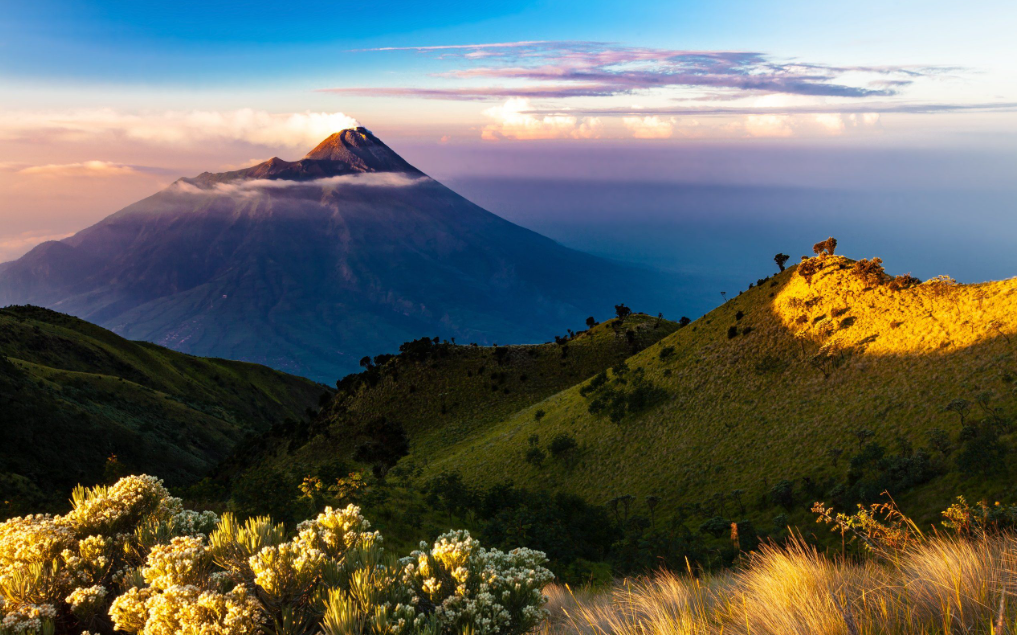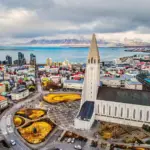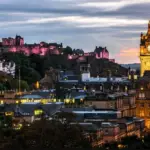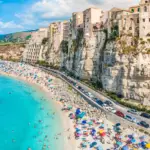
Welcome to the wonderful Java Island, a tropical destination that is a true treasure for those seeking adventure and natural beauty. Located in Indonesia, the island is known for its volcanoes imposing, paradisiacal beaches and, above all, by welcoming people that welcome travelers with open arms. A trip to Java It is a unique experience that will remain in your memory forever.
Get ready to marvel at the stunning landscapes, uncover the island's secrets, and immerse yourself in thrilling adventures. Venture out on trails through volcanoes, relax on the white sand beaches and explore the vibrant cities of the region. Java is a destination that offers the best of the tropical world.
Main Conclusions:
- THE Java Island is a tropical treasure with volcanoes, beaches and welcoming people.
- Java is a perfect destination for those seeking adventure and natural beauty.
- The trails through volcanoes of Java are a exciting experience that cannot be lost.
- To the beaches paradisiacal of Java are the perfect place to relax and admire the natural beauty of the island.
- Culture and Java traditions are a cultural treasure worth exploring.
Discovering the Island of Java
Java is a magical island, full of attractions to discover and explore. If you're looking for adventure, natural beauty and culture, this is the perfect destination.
To begin your journey of discovery, you can visit the National park Ujung Kulon, a UNESCO World Heritage Site home to rare animal species such as the Javan rhinoceros. Another must-see tourist attraction is Borobudur Temple, one of the largest Buddhist structures in the world.
If you're a nature lover, don't miss Mount Bromo, an active volcano offering spectacular views of its steaming crater. Or, visit the Jomblang Caves, a series of caverns with underground rivers and impressive rock formations.
For even more adventure, you can hike to Mount Merapi, a volcano known for its activity and beautiful scenery. Or, if you prefer a more leisurely stroll, explore the paradisiacal beaches in the region, such as Parangtritis Beach and Senggigi Beach.
Regardless of what you choose, discover the Java Island It's an unforgettable experience. So, prepare to be amazed by everything this incredible destination has to offer.

The Cultural Wealth of Java
Java is a cultural treasure, with deep and unique traditions that enchant visitors. Java culture It is rich in art, dance, music and architecture, reflecting the influence of different religions and peoples who have inhabited the island over the centuries.
To the Java traditions are also evident in its unique architecture, filled with majestic temples and palaces that reflect Hindu-Buddhist influence. The famous Borobudur temple, a UNESCO World Heritage Site, is a stunning example of Javanese architecture, with its carved stone towers and extensive galleries decorated with Buddha sculptures.
THE music and dance are also fundamental elements of culture of JavaGamelan is a set of traditional musical instruments, while Javanese dance is known for its graceful and elegant movements. Colorful festivals such as the Jember Fashion Carnival and the Kuda Lumping Festival showcase the beauty and vibrancy of Javanese dance. local culture.
Java Traditions
To the Java traditions include unique religious practices, ceremonies, and rituals. Wayang Kulit, for example, is a traditional form of shadow theater that has been popular on the island for centuries. The dark, intricate figures are carved from leather and manipulated to tell epic stories from Javanese mythology.
Rituals are also an important part of Javanese culture, including the Javanese wedding ceremony, where the bride and groom exchange offerings and vows while wearing traditional attire. During the Batik ceremony, locals welcome the Javanese New Year by wearing batik, a colorful traditional fabric.
Java is a unmissable destination for culture lovers tradition and history. With its warm hospitality and extensive cultural heritage, Java offers a rich and unforgettable experience.

Adventures in the Volcanoes of Java
The island of Java is an incredible destination for adventurous travelers. With its majestic volcanoes and incredible landscapes, this is the land of the unexpected. So, get ready for unique experiences with challenging trails, steaming craters, and breathtaking views. volcanoes of Java are one of the most popular attractions in the region and promise unforgettable adventures.
One of Java's most famous volcanoes is Mount Bromo. At 2,329 meters high, this mountain is one of Indonesia's most visited tourist attractions. The hike to the top is challenging, but the panoramic sunrise view will be unforgettable. If you're feeling adventurous, explore the steaming crater of Mount Merapi, one of the world's most active volcanoes.
For more experienced adventurers, one option is to take a night hike to the top of Mount Ijen to admire its famous blue flames. A fascinating and unique spectacle!
If you want to explore the region in greater comfort, hire a tour guide. There are several tour options available that include transportation and safety equipment. This way, you can fully enjoy the incredible adventures that await you. volcanoes of Java have to offer.
An important tip is to wear comfortable clothing suitable for long hikes. Also, don't forget to bring water and snacks to ensure a safe and comfortable hike. Enjoy your adventures on Java's volcanoes and return home with many incredible stories and experiences to share!

Paradise Beaches of Java
Java is a true tropical paradise with breathtaking beaches. If you're looking for sun, sand, and sea, this island is the perfect place for you. Discover the region's best beaches, with white sand, crystal-clear waters, and a relaxing atmosphere.
One of the most beautiful is Parangtritis Beach, with its impressive cliffs and strong waves. Ideal for surfers and nature lovers. Or if you prefer something more peaceful, visit Klayar Beach, with its natural pools and calm waters.
Another option is Anyer Beach, located just a few hours from Jakarta, with its crystal clear waters and white sand.
Paradise Beaches of Java
If you're passionate about diving, you can't miss Karimun Jawa Beach, a true underwater treasure with a wide variety of marine life.
Regardless of which beach you choose, the scenery is always impressive. beaches of Java offer a unique, relaxing and unforgettable experience.
Vibrant Cities of Java
The island of Java is not only a tropical paradise with lush landscapes and incredible beaches, but it is also home to vibrant cities and cosmopolitans that represent the cultural diversity of the Javanese people. During your trip to Java, it is a must-see explore these destinations captivating and get to know their traditions, gastronomy and daily life up close.

Jakarta
The country's capital, Jakarta, is a vibrant and bustling city that represents Indonesia's economic development while still preserving its rich cultural heritage. During your visit, be sure to visit the National Museum, which houses a vast collection of artifacts. historical and cultural aspects of the country, and the National Monument, an important symbol of Indonesian independence.
For shopaholics, Jakarta offers a wide variety of shopping centers, such as Grand Indonesia and Plaza Indonesia, where you can find everything from designer stores to local crafts. Jakarta's cuisine is a distinct attraction, with a blend of traditional and international flavors, such as the famous Soto Betawi, and Dutch influences in the city's cuisine.

Yogyakarta
Located in the heart of Java, Yogyakarta is a city brimming with art and culture. Known as the City of Sultans, it is an important center of traditional art and education, representing the essence of Javanese culture. During your visit, be sure to visit the Sultan's Palace, one of the city's most famous attractions, and Borobudur Temple, a UNESCO World Heritage Site and one of the most impressive Buddhist temples in the world.
Yogyakarta is also famous for its unique cuisine, with dishes like Gudeg, a local specialty made with pork in a sweet broth, and Bakpia Pathok, a bean sweet popular in the region. The city is also a popular destination for art and history students, with several schools and museums dedicated to preserving Javanese culture.
In short, the cities of Java are a reflection of the country's cultural and historical diversity, offering a unique experience for travelers looking to explore the richness of this tropical destination. Get to know the lives of the welcoming people of Java and get a taste of what the real Indonesia is like.
Javanese Gastronomy
Javanese cuisine is a true feast for the senses, full of unique flavors and aromas. Javanese food combines fresh, healthy ingredients with exotic, spicy seasonings. Be sure to try some of the region's most traditional dishes during your visit to Java.
One of the most famous dishes is Nasi Goreng, fried rice with vegetables, eggs, and meat or shrimp, which can be found in almost every restaurant in the city. Another very popular dish is Gado-Gado, a vegetable salad with peanut sauce.
Javanese cuisine is famous for its spiciness, so if you don't like spicy food, it's best to ask your server to make your dish less spicy. Javanese desserts are also delicious, including Es Teler, a blend of tropical fruits and coconut milk, and Martabak, a crepe-like dish filled with chocolate, cheese, or meat.
In Java, food is much more than just a daily necessity; it's a cultural experience that reflects the region's richness and diversity. So, get ready to savor the authentic flavors of Java.
Javanese Lodging and Hospitality
To fully enjoy your trip to Java, it's important to choose the type of accommodation that best suits your needs. The island offers a wide variety of options, from luxurious resorts to traditional accommodations, ensuring comfort and convenience for all tastes and budgets. Whatever your choice, one thing is certain: Javanese hospitality will make you feel at home.
Hotels in Java are known for their high-quality service and friendliness. Most staff speak English and are always ready to help with any questions or needs. Additionally, many hotels offer additional services such as airport transfers, sightseeing tours, and recreational activities for the whole family.
| Hosting | Javanese Hospitality |
|---|---|
| Luxury resorts | Personalized service and first-class services |
| Modern hotels | Friendly and attentive staff |
| Traditional villages | Welcoming and family atmosphere |
If you want to experience the real Javanese hospitality, consider staying in a traditional village. These accommodations offer an authentic local lifestyle experience and are a great option for those looking for something different from a conventional hotel. local residents They welcome guests with open arms and are always willing to share their stories and culture.
Regardless of the hosting option chosen, the Javanese hospitality is a striking feature throughout the island. The Javanese are known for their kindness and generosity, and will do anything to ensure you have a pleasant and unforgettable stay.
Tips and Recommendations for your Trip to Java
Before embarking on this unforgettable adventure, it's important to consider a few tips to make the most of your trip to Java.
Required documents
To enter Indonesia, you must present a passport valid for at least six months and a tourist visa, which can be obtained upon arrival. It's important to check entry requirements with the relevant authorities.
Climate
Java is a hot and humid destination year-round, with average temperatures above 25°C. The best time to visit the island is between May and September, when there is less rainfall and temperatures are milder.
Transport
To get around Java, you can use public transportation, such as buses and trains, or hire a private driver to take you to your desired destinations. It's important to negotiate prices before booking the service.
Security
Java is a safe destination to visit, but it's always important to keep an eye on your belongings and avoid isolated areas at night. Hiring local guides is recommended for exploring more remote areas.
Vaccines
There are no specific vaccination requirements to enter Indonesia, but it is recommended that you are up to date with basic vaccinations.
Local culture
To avoid offending the local culture, it is important to dress appropriately when visiting sacred places and show respect to the traditions and customs of the Javanese people.
With these tips in mind, your trip to Java will be even more amazing and unforgettable. Enjoy the natural beauty, the rich culture and hospitality of the Javanese people!
Conclusion about Java
With lush nature, imposing volcanoes, idyllic beaches, and a rich culture, Java is an unforgettable tropical destination. We hope you're excited to explore this unique island and marvel at all it has to offer.
Discover the natural beauty of the island, such as the Bromo and Merapi volcanoes, the white sand beaches and crystal clear waters and the rich culture of the Javanese people, reflected in their architecture, traditional dances and colorful festivals.
Enjoy delicious Javanese cuisine and experience the genuine hospitality of the local people in their traditional accommodations and luxurious resorts.
Remember to check out our tips and recommendations to make the most of your trip. With the necessary documents in hand, enjoy the tropical climate, explore the vibrant cities of Java, such as Jakarta and Yogyakarta, and immerse yourself in this tropical adventure unforgettable.

Travel to Java and create unforgettable memories!
FAQ
Q: Where is the island of Java?
A: The island of Java is located in Indonesia, in Southeast Asia.
Q: What are the main tourist attractions in Java?
A: Some of the top tourist attractions in Java include Mount Bromo, Borobudur Temple, Pangandaran beaches, and the city of Yogyakarta.
Q: What is the best time of year to visit Java?
A: The best time to visit Java is during the months of April to October, when the weather is drier and temperatures are more moderate.
Q: Is it safe to travel to Java?
A: Java is generally a safe travel destination. However, it's always important to take safety precautions and be aware of your personal belongings.
Q: What are the typical dishes of Javanese cuisine?
A: Some typical Javanese dishes include Nasi Goreng (fried rice), Gado-Gado (salad with peanut sauce), Satay (meat skewers) and Soto Ayam (chicken soup).
Q: Is a visa required to enter Java?
A: Yes, a tourist visa is required to enter Java. Be sure to check visa requirements before traveling.
Q: What currency is used in Java?
A: The currency used in Java (and throughout Indonesia) is the Indonesian rupiah (IDR).
Q: What is the best way to get around in Java?
A: The best way to get around Java is by public transportation, such as buses and trains. You can also rent a car or hire a private driver.
Q: What are the Java hosting options?
A: In Java, you'll find a variety of accommodation options, from luxury resorts to traditional guesthouses and hostels for budget travelers.
Q: What to do in case of emergency in Java?
A: In case of an emergency in Java, you can call the local emergency number (112) or seek help from local authorities or your hotel.
Q: What are the main cultural attractions in Java?
A: Some of the top cultural attractions in Java include Borobudur Temple, the Sultan's Palace in Yogyakarta, and Prambanan Temple.
Lucas Wanderlust has a tireless spirit of adventure, always seeking new travel experiences. Fascinated by the world and the possibility of exploring unknown destinations, he fell in love with the sense of freedom and self-discovery that traveling alone provides. With a backpack on his back and a heart open to the unknown, Lucas embarks on exciting journeys, where each destination becomes a unique chapter in his life story. He gives himself body and soul to the magic of solo travel, inspiring others to follow in his footsteps and discover themselves through adventure.







